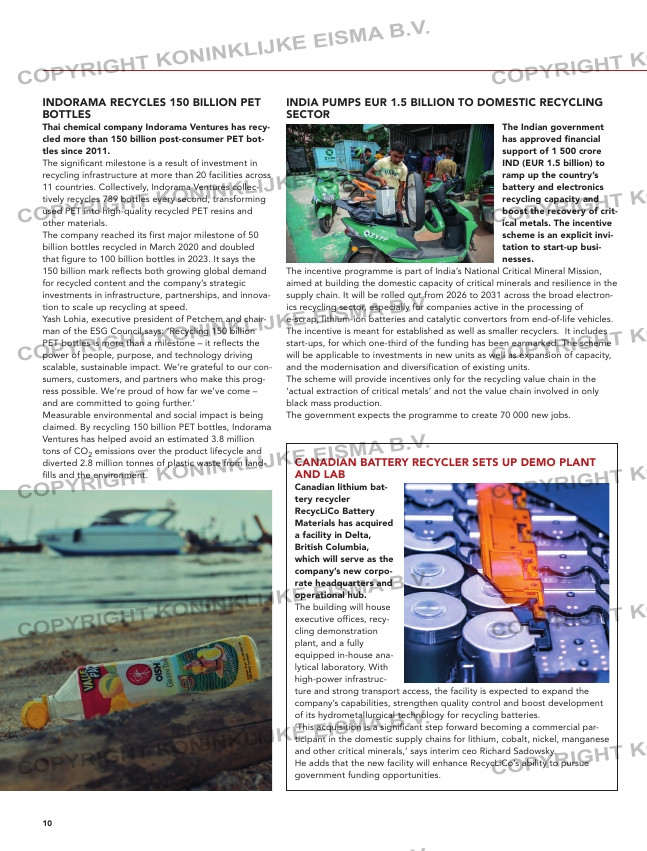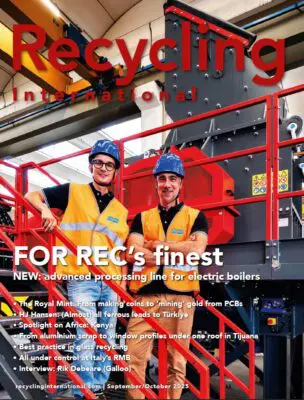Page 10 from: Recycling International September/October 2025

10
EARLY SUCCESS FOR MANDATORY EPR SCHEMES IN
SOUTH AFRICA
A new mandato-
ry extended
producer
responsibility
(EPR) scheme in
South Africa for
liquid board
packaging (LBP)
has seen collec-
tion and recy-
cling rates more
than double in
the past year.
Following the implementation of EPR legislation three years ago, the
producer responsibility organisation Petco has also met the annual
collection targets for PET bottles and jars, and their associated clo-
sures and labels.
Petco ceo Telly Chauke says: ‘We’re particularly delighted with the
success of our new EPR scheme for LBP, which saw us achieve a more
than 200% increase in its collection and recycling rate last year.
‘In only our second year of administering a scheme for these cartons,
we’ve collected and recycled three times the volume compared to
2023.’
Chauke said the this was a validation of Petco’s operating model,
which is based on building sustainable value chains for the post-con-
sumer packaging schemes it administers. Its 29 membersinclude
Coca-Cola, PepsiCo, Tiger Brands and Tetra Pak.
The collection of post-consumer PET bottles and jars has grown from
16% of those placed on market in 2005 to nearly 76% of products its
members place on the market today.
‘With over 70% of our members’ PET bottles and jars now successful-
ly recycled, our goal is to achieve similar results for LBP in the long-
term,’ she says.
In 2024, Petco spent R70 million (EUR 3.4 million) supporting the
value chain, enabling its recycling partners to purchase approximate-
ly R470 million in post-consumer packaging materials from small
businesses.
INDORAMA RECYCLES 150 BILLION PET
BOTTLES
Thai chemical company Indorama Ventures has recy-
cled more than 150 billion post-consumer PET bot-
tles since 2011.
The significant milestone is a result of investment in
recycling infrastructure at more than 20 facilities across
11 countries. Collectively, Indorama Ventures collec-
tively recycles 789 bottles every second, transforming
used PET into high-quality recycled PET resins and
other materials.
The company reached its first major milestone of 50
billion bottles recycled in March 2020 and doubled
that figure to 100 billion bottles in 2023. It says the
150 billion mark reflects both growing global demand
for recycled content and the company’s strategic
investments in infrastructure, partnerships, and innova-
tion to scale up recycling at speed.
Yash Lohia, executive president of Petchem and chair-
man of the ESG Council,says: ‘Recycling 150 billion
PET bottles is more than a milestone – it reflects the
power of people, purpose, and technology driving
scalable, sustainable impact. We’re grateful to our con-
sumers, customers, and partners who make this prog-
ress possible. We’re proud of how far we’ve come –
and are committed to going further.’
Measurable environmental and social impact is being
claimed. By recycling 150 billion PET bottles, Indorama
Ventures has helped avoid an estimated 3.8 million
tons of CO2 emissions over the product lifecycle and
diverted 2.8 million tonnes of plastic waste from land-
fills and the environment.
INDIA PUMPS EUR 1.5 BILLION TO DOMESTIC RECYCLING
SECTOR
The Indian government
has approved financial
support of 1 500 crore
IND (EUR 1.5 billion) to
ramp up the country’s
battery and electronics
recycling capacity and
boost the recovery of crit-
ical metals. The incentive
scheme is an explicit invi-
tation to start-up busi-
nesses.
The incentive programme is part of India’s National Critical Mineral Mission,
aimed at building the domestic capacity of critical minerals and resilience in the
supply chain. It will be rolled out from 2026 to 2031 across the broad electron-
ics recycling sector, especially for companies active in the processing of
e-scrap, lithium-ion batteries and catalytic convertors from end-of-life vehicles.
The incentive is meant for established as well as smaller recyclers. It includes
start-ups, for which one-third of the funding has been earmarked. The scheme
will be applicable to investments in new units as well as expansion of capacity,
and the modernisation and diversification of existing units.
The scheme will provide incentives only for the recycling value chain in the
‘actual extraction of critical metals’ and not the value chain involved in only
black mass production.
The government expects the programme to create 70 000 new jobs.
CANADIAN BATTERY RECYCLER SETS UP DEMO PLANT
AND LAB
Canadian lithium bat-
tery recycler
RecycLiCo Battery
Materials has acquired
a facility in Delta,
British Columbia,
which will serve as the
company’s new corpo-
rate headquarters and
operational hub.
The building will house
executive offices, recy-
cling demonstration
plant, and a fully
equipped in-house ana-
lytical laboratory. With
high-power infrastruc-
ture and strong transport access, the facility is expected to expand the
company’s capabilities, strengthen quality control and boost development
of its hydrometallurgical technology for recycling batteries.
‘This acquisition is a significant step forward becoming a commercial par-
ticipant in the domestic supply chains for lithium, cobalt, nickel, manganese
and other critical minerals,’ says interim ceo Richard Sadowsky.
He adds that the new facility will enhance RecycLiCo’s ability to pursue
government funding opportunities.
sustainable wear parts for
sustainable recycling
www.stahlwerke-bochum.com
10-11-12-13-14-15_trendsupdates.indd 10 09-09-2025 09:03



